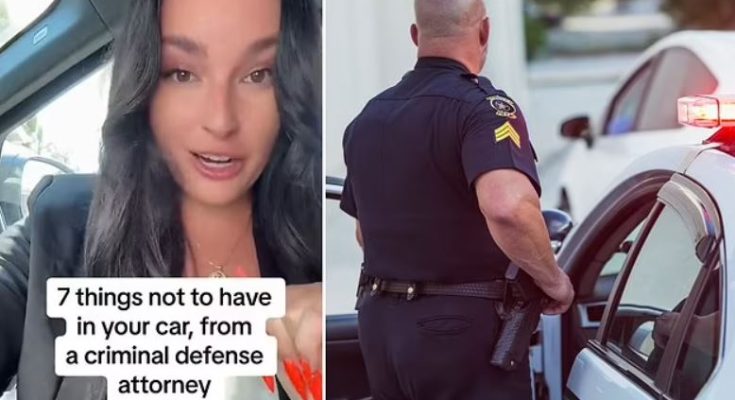Woman reveals the seven items and smells you should never have in your car: ‘I’m guilty of this’
Police officers could suspect criminal activity when spotting seven specific items – and one smell – in your vehicle, according to a lawyer.
Claire Highland, a criminal defense attorney, explained why these objects can put you in legal jeopardy in a TikTok video this week.
The California lawyer mentioned issues like smells or weapons when clarifying what shouldn’t be in someone’s vehicle.
Highland even admits in her video that she is ‘guilty’ of having one of these things in her car.
Possessing these items doesn’t mean you’re necessarily breaking the law, but their presence in your car can make any law official curious about a driver or passenger’s intentions.

Claire Highland, a criminal defense attorney, explained why seven items can put you in legal jeopardy in a TikTok video this week
Smell of Intoxicants

A driver’s odor does not always indicate that someone is guilty of driving under the influence of drugs or alcohol
One of the top reasons why an officer opens a DUI investigation is because they can ‘smell the odor of intoxicants’ after they pull someone over, according to Highmore.
She added that drivers who spilled alcohol on their clothing would also cause suspicion, even if they hadn’t been drinking.
Various law firms pointed out that smell does not always indicate that someone is guilty, and it should not be what decides if someone drove while under the influence of drugs or alcohol.
However, depending on how strong the odor is, officers could potentially assume that someone is not in the right frame of mind to be behind the wheel.
Open Containers

Police officers will give someone a driving violation if they spot an open bottle, car, jar, or flash with alcohol inside in most US states
Open alcoholic beverage containers can get drivers into big trouble, depending on what state they live in.
According to Highmore, in most states, officers will give someone a driving violation if they spot an open container in the driver’s car.
However, it can make police officers consider opening a DUI investigation.
Government officials have put open container laws into effect, and they prohibit someone from having or consuming an opened alcoholic beverage in a car while driving on the highway.
Examples of open containers in the eyes of the law are bottles, cans, jars and flasks that contain alcohol.
Weapons

A driver in New York could be charged with a class E felony if they commit this crime and receive a maximum four-year prison sentence
‘States are going to vary on what the laws are regarding carrying weapons,’ said Highmore.
It is legal for drivers in some states to travel with a weapon if they have a permit or license with them, and they can go without one if a long gun is in their car.
However, drivers who travel with unregistered firearms in their cars may face criminal charges depending on what state they’re in.
A driver in New York could be charged with a class E felony if they commit this crime and receive a maximum four-year prison sentence.
Other states that could give a driver possible jail time are California, Michigan and Illinois.
Dark Window Tint

Various states have different laws regarding tinted windows on vehicles. Penalties drivers can receive for breaking a window tinting law include a fix-it ticket and a fine
Tinted windows are standard vehicle features, and even Highmore’s car has them.
‘Technically, states have limitations on how dark your windows can be, and it can be enough to get you pulled over,’ the attorney said.
‘Once you get pulled over, they’re going to start looking for other things.’
Highmore and other California residents are only allowed to have the front passenger windows be tinted up to 70 percent, according to Rayno Film.
Other laws vary by state, and drivers in places like Vermont and New Jersey are not allowed to have front-side tinted windows at all.
Penalties drivers can receive for breaking a window tinting law include a fix-it ticket and a fine.
Expired Vehicle Registration

Driving with an expired vehicle registration is illegal in all 50 states, and the police can impound the driver’s car for that reason in some cases
An expired vehicle registration is a big deal, and if a driver is caught with one after being pulled over, they would receive a ticket and be forced to pay a fine.
‘Be aware of when they expire because you don’t want to get pulled over for a silly reason like this and then have something worse happen,’ Highmore said.
Driving with an expired vehicle registration is illegal in all 50 states, and the police can impound the driver’s car for that reason in some cases.
If that happens, the police will usually keep possession of the vehicle until the driver pays all their fines.
Invalid Driver’s License

The penalties for driving with an invalid license depend on the state, but they usually include hefty fines, demerit points and possible jail time
A driver’s license is invalid when it has been revoked or suspended by the DMV, according to Drive Safely.
‘If you just forgot your license, a lot of times you can clear that up by showing them proof that you do actually have a valid license,’ Highmore said.
‘If your license is suspended, that is a crime in most states, and you don’t want to be caught driving with one.’
Police officers will also suspect a driver of committing identity theft if they drive with a fake license or someone else’s.
The penalties for driving with an invalid license depend on the state, but they usually include hefty fines, demerit points and possible jail time.
Drug Paraphernalia

Punishment for drug paraphernalia possession varies depending on the state, primarily because of the legalization of marijuana in parts of the US
Highmore mentioned any smoking devices in ‘plain view’ could lead to a police officer believing a driver used it before or while driving.
She added this applies to ‘anything that’s going to make it look like you were doing something illegal.’
Punishment for this drug crime varies depending on the state, primarily because of the legalization of marijuana in parts of the US.
Possession of drug paraphernalia is generally treated as a misdemeanor at the state level, but under federal law, it is punishable with a fine and up to three years in jail.



